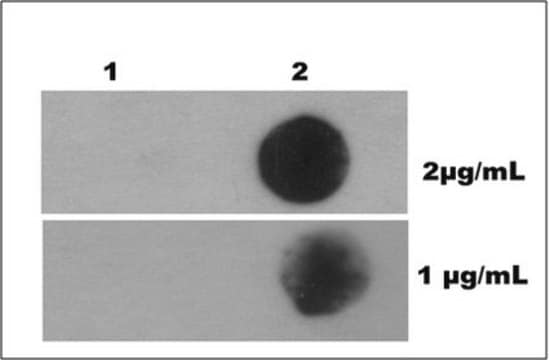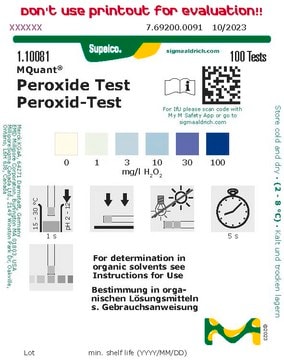MAK165
Fluorimetric Hydrogen Peroxide Assay Kit
sufficient for 500 fluorometric tests (red fluorescence)
Synonym(s):
Hydrogen Peroxide Quantification Kit
Sign Into View Organizational & Contract Pricing
All Photos(2)
About This Item
UNSPSC Code:
12161503
NACRES:
NA.84
Recommended Products
usage
sufficient for 500 fluorometric tests (red fluorescence)
detection method
fluorometric
relevant disease(s)
cardiovascular diseases; aging/geriatric diseases; orthopedic diseases; pulmonary disorders; neurological disorders
storage temp.
−20°C
Related Categories
General description
Hydrogen peroxide, a reactive oxygen species produced through the metabolism of molecular oxygen, serves as both an intracellular signaling messenger and a source of oxidative stress. Hydrogen peroxide is generated in cells via multiple mechanisms such as the NOX-mediated ROS production by neutrophils and macrophages (respiratory burst) or by the dismutase of superoxide anions produced as a result of electron leak during mitochondrial respiration. Abnormal hydrogen peroxide production contributes to oxidative cell damage and the progression of diseases such as asthma, atherosclerosis, osteoporosis, and neurodegeneration.
Features and Benefits
Compatible with high-throughput handling systems.
Suitability
This kit is suitable to quantify hydrogen peroxide levels in a variety of samples such as cellular extracts and solutions.
Principle
The Fluorescent Hydrogen Peroxide Assay Kit provides a simple and reproducible method to quantify hydrogen peroxide levels in a variety of samples such as cellular extracts and solutions. This kit can also be used to detect hydrogen peroxide released from living cells or produced by oxidase activities. This kit utilizes a peroxidase substrate that generates a red fluorescent product (λex = 540/λem = 590 nm) after reaction with hydrogen peroxide that can be analyzed by a fluorescent microplate reader.
Signal Word
Danger
Hazard Statements
Precautionary Statements
Hazard Classifications
Acute Tox. 4 Oral - Resp. Sens. 1
Storage Class Code
10 - Combustible liquids
Flash Point(F)
Not applicable
Flash Point(C)
Not applicable
Choose from one of the most recent versions:
Already Own This Product?
Find documentation for the products that you have recently purchased in the Document Library.
Customers Also Viewed
Gaëtan Caravello et al.
Frontiers in immunology, 13, 858360-858360 (2022-05-03)
Microsporidia are obligate intracellular parasites able to infest specifically a large range of species, including insects. The knowledge about the biology of microsporidial infections remains confined to mostly descriptive studies, including molecular approaches such as transcriptomics or proteomics. Thus, functional
Rakesh Ruchel Khanikar et al.
RSC advances, 12(15), 9466-9472 (2022-04-16)
Cold atmospheric pressure (CAP) plasma has a profound effect on protein-protein interactions. In this work, we have highlighted the deactivation of the Severe Acute Respiratory Syndrome Coronavirus 2 (SARS-CoV-2) spike protein by CAP plasma treatment. Complete deactivation of spike protein
Eda Gjika et al.
ACS applied materials & interfaces, 10(11), 9269-9279 (2018-02-24)
Cold atmospheric plasma (CAP), an ionized gas operated at near-ambient temperatures, has been introduced as a new therapeutic opportunity for treating cancers. The effectiveness of the therapy has been linked to CAP-generated reactive oxygen and nitrogen species such as hydrogen
Barbara Bayer et al.
mSystems, 4(4) (2019-06-27)
Ammonia-oxidizing archaea (AOA) play an important role in the nitrogen cycle and account for a considerable fraction of the prokaryotic plankton in the ocean. Most AOA lack the hydrogen peroxide (H2O2)-detoxifying enzyme catalase, and some AOA have been shown to
Xu Chen et al.
Free radical biology & medicine, 160, 191-198 (2020-08-19)
Adropin has been reported to be involved in metabolic disorders, including nonalcoholic fatty liver disease (NAFLD). However, the clinical relevance of adropin expression to the histological severity of NAFLD is unclear. This study aimed to investigate adropin expression in biopsy-proven
Our team of scientists has experience in all areas of research including Life Science, Material Science, Chemical Synthesis, Chromatography, Analytical and many others.
Contact Technical Service









